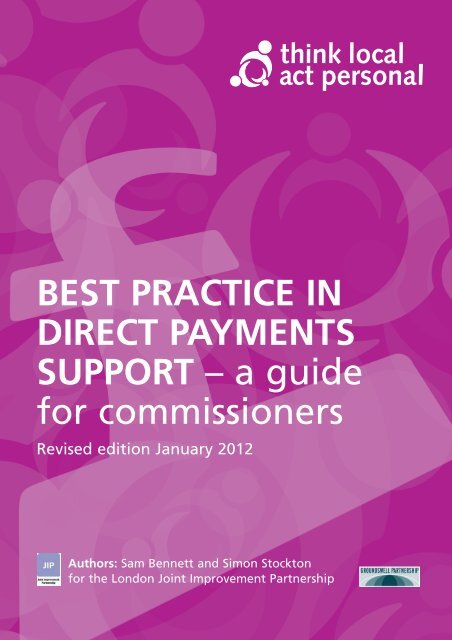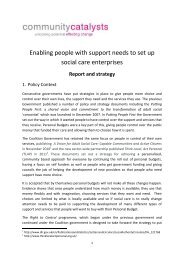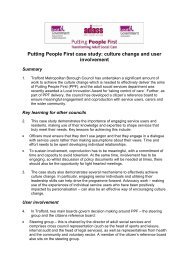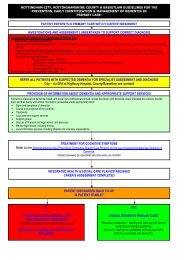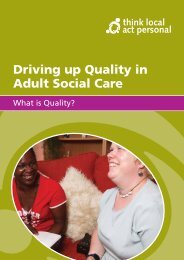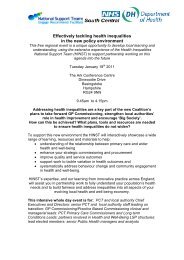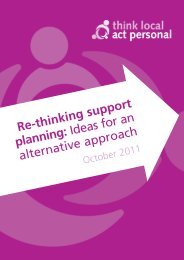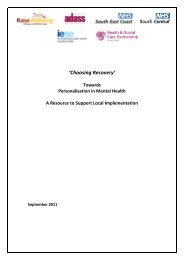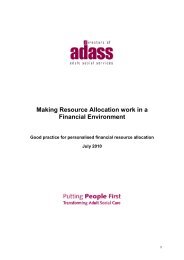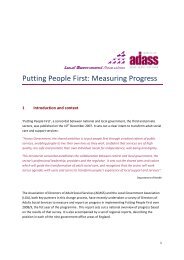Best Practice in Direct Payments Support - Think Local Act Personal
Best Practice in Direct Payments Support - Think Local Act Personal
Best Practice in Direct Payments Support - Think Local Act Personal
Create successful ePaper yourself
Turn your PDF publications into a flip-book with our unique Google optimized e-Paper software.
BEST PRACTICE IN<br />
DIRECT PAYMENTS<br />
SUPPORT – a guide<br />
for commissioners<br />
Revised edition January 2012<br />
Authors: Sam Bennett and Simon Stockton<br />
for the London Jo<strong>in</strong>t Improvement Partnership
Contents<br />
Executive summary<br />
Introduction<br />
<strong>Direct</strong> <strong>Payments</strong> support basics<br />
The challenges we face<br />
A model of best practice for support services<br />
Mak<strong>in</strong>g it cost effective<br />
Choos<strong>in</strong>g the best service<br />
Conclud<strong>in</strong>g thoughts<br />
1<br />
2<br />
3<br />
5<br />
7<br />
24<br />
26<br />
31
Executive summary<br />
This report was <strong>in</strong>itially developed by Groundswell Partnership for the London<br />
Jo<strong>in</strong>t Improvement Partnership (JIP) and published <strong>in</strong> November 2011. This revised<br />
edition is launched through the Th<strong>in</strong>k <strong>Local</strong> <strong>Act</strong> <strong>Personal</strong> partnership and the<br />
London JIP to support commissioners <strong>in</strong> all parts of the country who are grappl<strong>in</strong>g<br />
with the same challenges of develop<strong>in</strong>g support services for much larger numbers<br />
of direct payments recipients. It was written with the support of the National<br />
Centre for Independent Liv<strong>in</strong>g (NCIL) and was <strong>in</strong>formed by representatives from<br />
London councils, DP support providers, people us<strong>in</strong>g DPs <strong>in</strong> the London area,<br />
<strong>Direct</strong>ors of Adult Social Services and members of the Th<strong>in</strong>k <strong>Local</strong> <strong>Act</strong> <strong>Personal</strong><br />
partnership. Key messages <strong>in</strong>clude:<br />
• The current drive to <strong>in</strong>crease personal budgets,<br />
with direct payments as the chosen option for<br />
<strong>in</strong>creas<strong>in</strong>g numbers of people, presents<br />
significant challenges that demand new ways of<br />
th<strong>in</strong>k<strong>in</strong>g about direct payments support.<br />
• Ris<strong>in</strong>g to the challenge will require a strategic<br />
response <strong>in</strong>volv<strong>in</strong>g commissioners, providers and<br />
people with care and support needs work<strong>in</strong>g<br />
together to shape local commission<strong>in</strong>g.<br />
• In future, s<strong>in</strong>gle service solutions are not likely to<br />
be adequate and commissioners should look to<br />
develop a mixed market of direct payments support.<br />
• There should always be a role for local ULOs <strong>in</strong> a<br />
mixed model of support also encompass<strong>in</strong>g larger<br />
providers with the capacity and <strong>in</strong>frastructure to<br />
meet significant growth <strong>in</strong> demand.<br />
• The scope of direct payments support should<br />
<strong>in</strong>clude support for people to use them for a<br />
wide variety of purposes other than employ<strong>in</strong>g<br />
staff directly. There are many examples of people<br />
us<strong>in</strong>g direct payments to access work, start a<br />
micro-enterprise or to pool their budgets to buy<br />
services collectively. Many others can also benefit<br />
from simply hold<strong>in</strong>g the purse str<strong>in</strong>gs and buy<strong>in</strong>g<br />
services directly from registered care providers.<br />
• This report sets out a model of good practice for<br />
direct payments support, co-produced with key<br />
stakeholders, that provides a useful start<strong>in</strong>g po<strong>in</strong>t<br />
for understand<strong>in</strong>g what needs to be <strong>in</strong> place and<br />
how to know when it’s work<strong>in</strong>g.<br />
• The “Choos<strong>in</strong>g the best service” tool <strong>in</strong><br />
this report will assist <strong>in</strong> local plann<strong>in</strong>g and<br />
decision mak<strong>in</strong>g.<br />
BEST PRACTICE IN DIRECT PAYMENTS SUPPORT – a guide for commissioners 1
Introduction<br />
In the roll out of personal budgets, evidence has shown that people who<br />
use <strong>Direct</strong> <strong>Payments</strong> tend to get better outcomes than people who use<br />
managed budgets.<br />
The Government and the sector partnership Th<strong>in</strong>k<br />
<strong>Local</strong> <strong>Act</strong> <strong>Personal</strong> have also stressed that <strong>in</strong>creas<strong>in</strong>g<br />
the take up of direct payments (DPs) should be a<br />
key priority for councils as they cont<strong>in</strong>ue to<br />
transform local adult social care systems and work<br />
towards mak<strong>in</strong>g personal budgets available to<br />
everyone eligible to receive them <strong>in</strong> the next two<br />
years. Evidence from a number of sources, <strong>in</strong>clud<strong>in</strong>g<br />
SCIE, has found that support arrangements are vital<br />
to the successful implementation of personal<br />
budgets and for direct payments <strong>in</strong> particular. It has<br />
also been noted that more consistent support is<br />
required to encourage the take up of direct<br />
payments by some currently under-represented<br />
groups, such as older people. 1<br />
So what support do people need <strong>in</strong> order to take up<br />
and use direct payments and what is the most cost<br />
effective way of commission<strong>in</strong>g and provid<strong>in</strong>g it This<br />
report, funded by the London Jo<strong>in</strong>t Improvement<br />
Partnership, explores what best practice support for<br />
direct payments looks like and the implications of the<br />
current policy drive to <strong>in</strong>crease uptake. It also looks<br />
at different ways of th<strong>in</strong>k<strong>in</strong>g about cost effectiveness<br />
<strong>in</strong> this context and provides po<strong>in</strong>ters and practical<br />
tools to assist local decision makers. The report is<br />
aimed primarily at commissioners, but will also be<br />
of <strong>in</strong>terest to direct payments support organisations<br />
(DPSOs), micro-enterprises work<strong>in</strong>g <strong>in</strong> health and<br />
social care, care providers, people us<strong>in</strong>g or<br />
consider<strong>in</strong>g us<strong>in</strong>g direct payments and those with<br />
a general <strong>in</strong>terest <strong>in</strong> this field.<br />
In develop<strong>in</strong>g this paper we worked closely with the<br />
National Centre for Independent Liv<strong>in</strong>g (NCIL),<br />
people liv<strong>in</strong>g <strong>in</strong> London us<strong>in</strong>g direct payments,<br />
direct payments support organisations, local<br />
authority commissioners, the London Self-<strong>Direct</strong>ed<br />
<strong>Support</strong> Forum and from colleagues and experts<br />
from the Th<strong>in</strong>k <strong>Local</strong> <strong>Act</strong> <strong>Personal</strong> Partnership. We<br />
are grateful to all those who contributed to this<br />
paper and to Freya El Baz for coord<strong>in</strong>at<strong>in</strong>g the<br />
research <strong>in</strong>volved.<br />
Background<br />
Follow<strong>in</strong>g the publication of Th<strong>in</strong>k <strong>Local</strong> <strong>Act</strong><br />
<strong>Personal</strong>, (TLAP) the London Jo<strong>in</strong>t Improvement<br />
Partnership identified a number of priority areas<br />
for development to support local councils to better<br />
understand and respond to the challenges outl<strong>in</strong>ed<br />
<strong>in</strong> TLAP, <strong>in</strong>clud<strong>in</strong>g work to undertake and evaluate<br />
different support/brokerage models that help<br />
people take up and use direct payments. The<br />
project brief was to undertake an appraisal of<br />
effective delivery of support and advice for people<br />
us<strong>in</strong>g or wish<strong>in</strong>g to use direct payments, to explore<br />
the implications for commissioners and to consider<br />
how an improved understand<strong>in</strong>g of outcomes<br />
and cost effectiveness could <strong>in</strong>form better local<br />
decision mak<strong>in</strong>g.<br />
1 See SCIE Research brief<strong>in</strong>g 20; The implementation of <strong>in</strong>dividual budget schemes <strong>in</strong> adult social care<br />
http://www.scie.org.uk/publications/brief<strong>in</strong>gs/brief<strong>in</strong>g20/. Also Davey et al’s 2007 national survey of direct payments<br />
http://www.changecards.org/evidence/direct-payments-a-national-survey-of-direct-payments-policy-and-practice-2007/<br />
2 BEST PRACTICE IN DIRECT PAYMENTS SUPPORT – a guide for commissioners
Approach<br />
Our start<strong>in</strong>g po<strong>in</strong>t was to co-design a framework<br />
for understand<strong>in</strong>g good practice <strong>in</strong> direct payments<br />
support. We did this together with people us<strong>in</strong>g<br />
direct payments, commissioners and DPSO’s as well<br />
as key strategic organisations with an <strong>in</strong>terest <strong>in</strong> the<br />
field, particularly NCIL and the London Self-<strong>Direct</strong>ed<br />
<strong>Support</strong> Forum. We brought together a group of<br />
people <strong>in</strong>corporat<strong>in</strong>g all these perspectives to codesign<br />
the framework and debate a range of issues.<br />
This <strong>in</strong>cluded ask<strong>in</strong>g people to th<strong>in</strong>k <strong>in</strong> some depth<br />
about outcomes, cost effectiveness and what we<br />
might need to measure to understand success <strong>in</strong><br />
deliver<strong>in</strong>g direct payments support. In addition,<br />
we conducted some research <strong>in</strong>to current practice<br />
across London and beyond, explor<strong>in</strong>g examples of<br />
<strong>in</strong>novative direct payments support that help to<br />
br<strong>in</strong>g the framework to life.<br />
We th<strong>in</strong>k it is very important to understand what<br />
great support looks like for people who use or<br />
might use direct payments and to know what a<br />
support service should be do<strong>in</strong>g to serve them well.<br />
We have structured the report to reflect this<br />
conviction and to provide an easy reference for<br />
people to understand good practice <strong>in</strong> a way that<br />
reflects the outcomes we are all aim<strong>in</strong>g to achieve.<br />
<strong>Direct</strong> <strong>Payments</strong> support basics<br />
<strong>Direct</strong> payments support organisations have been around s<strong>in</strong>ce at least 1997<br />
when the first direct payments legislation was enacted. Accompany<strong>in</strong>g guidance<br />
to this and subsequent legislation has repeatedly stressed the need for councils<br />
to provide support services for people that help them consider whether direct<br />
payments may suit them and if so, how to use them safely and effectively.<br />
Most councils responded to this requirement by<br />
commission<strong>in</strong>g support services to accompany local<br />
direct payments schemes. As the market for<br />
support has developed over the last 15 years it has<br />
done so slowly and on a relatively small scale,<br />
operat<strong>in</strong>g largely at the marg<strong>in</strong>s of social care.<br />
Despite its niche status, it is nonetheless quite a<br />
mature and established market. Taken as a whole it<br />
offers a rich and diverse range of services to people<br />
us<strong>in</strong>g or th<strong>in</strong>k<strong>in</strong>g about us<strong>in</strong>g direct payments,<br />
spann<strong>in</strong>g specialist employment advice, support<br />
plann<strong>in</strong>g, payroll services and peer support among<br />
other th<strong>in</strong>gs. Although some services have a broad<br />
reach beyond local geographical boundaries, the<br />
market has mostly developed as a local “cottage<br />
<strong>in</strong>dustry” work<strong>in</strong>g with small numbers of people,<br />
numbers hav<strong>in</strong>g only recently risen to an average of<br />
9% of adults receiv<strong>in</strong>g ongo<strong>in</strong>g care and support.<br />
At a local level, <strong>in</strong>novation and diversity are not the<br />
features that would first strike people look<strong>in</strong>g to<br />
use direct payments support services. The services<br />
people can access are mostly dependent on what<br />
has been commissioned by the local council, and <strong>in</strong><br />
the current economic climate people’s experience of<br />
support is more likely to be of overstretched<br />
services try<strong>in</strong>g hard to stay afloat with decreas<strong>in</strong>g<br />
staff<strong>in</strong>g and budgets.<br />
BEST PRACTICE IN DIRECT PAYMENTS SUPPORT – a guide for commissioners 3
Perhaps not surpris<strong>in</strong>gly, there has been a significant<br />
<strong>in</strong>crease recently <strong>in</strong> the use of web-based<br />
technologies for deliver<strong>in</strong>g advice and support and to<br />
help networks of people to come together. There is<br />
much to learn from less resource <strong>in</strong>tensive approaches<br />
that do not rely on one-to-one professional support<br />
and use techniques that enable people to do as much<br />
as possible for themselves and with the help of peers.<br />
There are other <strong>in</strong>novations too, <strong>in</strong>clud<strong>in</strong>g the growth<br />
of organisations that support people, <strong>in</strong>clud<strong>in</strong>g direct<br />
payments recipients, to set up susta<strong>in</strong>able microenterprises<br />
that create jobs and <strong>in</strong>crease market<br />
diversity. There are many great examples of people<br />
us<strong>in</strong>g direct payments to become producers as well as<br />
consumers of support services.<br />
Typically there are three types of organisation that<br />
provide support to people us<strong>in</strong>g or th<strong>in</strong>k<strong>in</strong>g of<br />
us<strong>in</strong>g direct payments. These are:<br />
• Council’s own <strong>in</strong>-house support services<br />
• Small specialist, local services, often delivered<br />
by user led organisations, some act<strong>in</strong>g as<br />
Centres for Independent Liv<strong>in</strong>g (CILs)<br />
• Larger national or regional organisations that<br />
offer support to councils across the country,<br />
but not necessarily as their core bus<strong>in</strong>ess.<br />
In most <strong>in</strong>stances councils commission support<br />
<strong>in</strong>dividually and there is not yet a pattern of support<br />
be<strong>in</strong>g jo<strong>in</strong>tly commissioned by multiple councils to<br />
service a number of adjacent boroughs. We expect<br />
that this is an area that may expand <strong>in</strong> the future,<br />
as many boroughs are hungry to explore the<br />
potential for services to be delivered on a subregional<br />
basis. In London, Westm<strong>in</strong>ster,<br />
Hammersmith and Fulham and Kens<strong>in</strong>gton and<br />
Chelsea have the most ambitious current<br />
programme to <strong>in</strong>tegrate adult social care activity<br />
across a multi-authority area, although there is as<br />
yet no plan to jo<strong>in</strong>tly commission direct payment<br />
support services at “tri-borough” level.<br />
The market as it stands is not well placed to meet<br />
the challenge of a step change <strong>in</strong> the number of<br />
people with direct payments. If councils are to<br />
make personal budgets available to everyone<br />
eligible to receive them by 2013, with direct<br />
payments as the preferred delivery method, the<br />
market for direct payments support needs to grow<br />
and adapt beyond anyth<strong>in</strong>g that it has experienced<br />
<strong>in</strong> its 15 year history. Innovation needs to be<br />
encouraged so that people have a wider range of<br />
alternatives to traditional services, are able to come<br />
together and comb<strong>in</strong>e their resources easily and can<br />
pursue opportunities to contribute and develop<br />
enterpris<strong>in</strong>g ideas. The market must also provide a<br />
range tailored direct payments support which can<br />
appeal to particular groups of people, <strong>in</strong>clud<strong>in</strong>g<br />
older people and people with mental health<br />
difficulties. The next section of the report explores<br />
some of these issues <strong>in</strong> more detail.<br />
4 BEST PRACTICE IN DIRECT PAYMENTS SUPPORT – a guide for commissioners
The challenges we face<br />
The Government’s recent challenge to councils concern<strong>in</strong>g personal budgets and<br />
direct payments should not underestimated. Although councils have so far<br />
responded confidently to the challenge of <strong>in</strong>creas<strong>in</strong>g personal budgets, mak<strong>in</strong>g<br />
direct payments the preferred delivery method is arguably a much greater test. In<br />
the year to March 2011, the ADASS survey of personal budgets found that over<br />
339,000 people were receiv<strong>in</strong>g personal budgets (35.2%), exceed<strong>in</strong>g the<br />
government target of 30%, and nearly doubl<strong>in</strong>g the figure for 2010. However, the<br />
same report noted that ‘…nearly all of the <strong>in</strong>crease has been <strong>in</strong> managed budgets<br />
with no significant <strong>in</strong>crease <strong>in</strong> direct payments…’<br />
This is unfortunate when one considers the<br />
evidence that tak<strong>in</strong>g a direct payment substantially<br />
<strong>in</strong>creases the likelihood of people gett<strong>in</strong>g positive<br />
outcomes. Most recently, the POET survey of more<br />
than 2000 personal budget holders and their carers,<br />
which reported <strong>in</strong> July this year and was the biggest<br />
of its k<strong>in</strong>d so far conducted, made some particularly<br />
significant conclusions. It found not only that<br />
personal budgets work best when delivered as<br />
direct payments, but also that direct payments work<br />
well for older people as well as for younger people<br />
with disabilities. 2 This led TLAP to state <strong>in</strong> the paper<br />
Improv<strong>in</strong>g <strong>Direct</strong> <strong>Payments</strong> Delivery that ‘evidence<br />
cont<strong>in</strong>ues to suggest that direct payments are likely<br />
to be the more beneficial approach for the majority<br />
of personal budget holders, and that councils need<br />
a stronger focus on direct payments delivery.’<br />
The same paper <strong>in</strong>cluded a warn<strong>in</strong>g that ‘excessive<br />
bureaucracy has impeded overall delivery of<br />
personal budgets, and specifically the take-up of<br />
direct payments.’ 3<br />
Currently, direct payments make up less than 10p of<br />
every £1 spent on social care <strong>in</strong> England. If we accept<br />
the aspiration of direct payments as the preferred<br />
way of offer<strong>in</strong>g a personal budget, it would seem<br />
reasonable to assume that this might mean perhaps<br />
50% of eligible people eventually receiv<strong>in</strong>g them. This<br />
illustrates the potential scale of the task – at least a<br />
five-fold <strong>in</strong>crease and with<strong>in</strong> that, far higher <strong>in</strong>creases<br />
for certa<strong>in</strong> client groups not well represented <strong>in</strong> the<br />
current direct payments demographic.<br />
Whilst this paper concentrates on direct payments<br />
support services as an essential component of any<br />
local strategy to <strong>in</strong>crease take up, it is clear that<br />
change of this magnitude will require a fundamental<br />
shift <strong>in</strong> systems, processes and resources, and a drive<br />
to develop a wider diversity of provision. In this<br />
context, the development of an enhanced range of<br />
better support services is only one part of the strategic<br />
approach required, but it is nonetheless a fundamental<br />
platform from which to support the other developments<br />
necessary for personalisation to grow.<br />
2 See http://www.th<strong>in</strong>klocalactpersonal.org.uk/Latest/Resource/<strong>in</strong>dex.cfmcid=8993<br />
3 Improv<strong>in</strong>g <strong>Direct</strong> <strong>Payments</strong> Delivery, TLAP 2011<br />
BEST PRACTICE IN DIRECT PAYMENTS SUPPORT – a guide for commissioners 5
A number of people told us that even where there<br />
was strong evidence of the benefits of direct<br />
payments for local people, frontl<strong>in</strong>e staff and<br />
managers often found it hard to encourage their<br />
take up and were generally more comfortable sett<strong>in</strong>g<br />
up care packages consist<strong>in</strong>g of directly commissioned<br />
services. Moreover, both staff and potential direct<br />
payment holders were often put off by the unhelpful<br />
and lengthy processes associated with sett<strong>in</strong>g them<br />
up. Managers also expressed concern that a spike <strong>in</strong><br />
direct payments numbers could mean a lesser role<br />
for frontl<strong>in</strong>e staff and a reduced commission<strong>in</strong>g role<br />
for councils that could have destabiliz<strong>in</strong>g effects on<br />
exist<strong>in</strong>g services. Comb<strong>in</strong>ed with the perceived<br />
<strong>in</strong>crease <strong>in</strong> risk often unduly associated with direct<br />
payments, and it is not hard to see how many<br />
councils have struggled to make them an attractive<br />
proposition for large numbers of people or the<br />
frontl<strong>in</strong>e staff charged with offer<strong>in</strong>g them.<br />
For those that have made significant efforts to<br />
boost numbers the road has not been easy. One<br />
issue, which has been particularly difficult to resolve<br />
for both commissioners and providers, is the<br />
relationship between support to take up a direct<br />
payment and advocacy. People told us that<br />
advocacy is a core part of what they want from a<br />
direct payments support service, but commissioners<br />
voiced concern about mix<strong>in</strong>g advocacy with support<br />
to take up direct payments because of perceived<br />
conflicts of <strong>in</strong>terest. A number of commissioners<br />
told us that an unhealthy dynamic had developed<br />
between practitioners and local user led<br />
organisations, where referrals to support services<br />
had sometimes come back <strong>in</strong>clud<strong>in</strong>g challenges to<br />
the budget on offer. This has <strong>in</strong> turn led to<br />
reluctance on the part of practitioners to refer to<br />
external organisations.<br />
The resultant under utilisation of support services<br />
makes them appear very expensive and can render<br />
them unsusta<strong>in</strong>able. These issues were reflected <strong>in</strong><br />
the experience of numerous support providers we<br />
spoke to that compla<strong>in</strong>ed of complex processes and<br />
poor referral levels, comb<strong>in</strong>ed with <strong>in</strong>adequate<br />
communication with local commissioners. Despite<br />
these issues it is worth not<strong>in</strong>g that there was also<br />
an appetite for f<strong>in</strong>d<strong>in</strong>g ways to work together better<br />
and to meet the new challenges <strong>in</strong> partnership.<br />
People us<strong>in</strong>g direct payments told us that hav<strong>in</strong>g<br />
support to build their confidence to take them up<br />
was vital, <strong>in</strong>clud<strong>in</strong>g <strong>in</strong>formation about how they can<br />
be used. For some people this meant <strong>in</strong>formation<br />
about purchas<strong>in</strong>g support directly from care<br />
providers, while for others it meant access to options<br />
that removed or reduced their responsibilities as an<br />
employer. In addition, know<strong>in</strong>g that ongo<strong>in</strong>g support<br />
would be available if th<strong>in</strong>gs went wrong and hav<strong>in</strong>g<br />
someone to turn to who had “been there and done<br />
it” were seen as pivotal factors <strong>in</strong> mak<strong>in</strong>g it feel<br />
possible to “take the leap.” None of these th<strong>in</strong>gs is<br />
currently available to the extent needed to support<br />
the step change anticipated. Nevertheless, it was<br />
strik<strong>in</strong>g that no one we spoke to regretted the<br />
decision to take a direct payment. One person<br />
captured the strength of feel<strong>in</strong>g well “however hard<br />
it’s been, I’d never go back, never.”<br />
All of these pressures are happen<strong>in</strong>g at a time when<br />
<strong>Local</strong> Authorities are fac<strong>in</strong>g huge f<strong>in</strong>ancial<br />
upheavals and the press<strong>in</strong>g need to do more with<br />
less. To meet the challenges of mak<strong>in</strong>g direct<br />
payments a truly ma<strong>in</strong>stream, accessible and<br />
attractive option for the majority of people, the<br />
need for shared understand<strong>in</strong>g of what’s required<br />
and a commitment to work together to achieve it<br />
could hardly be more acute.<br />
6 BEST PRACTICE IN DIRECT PAYMENTS SUPPORT – a guide for commissioners
A model of best practice<br />
for support services<br />
From the work we undertook together with people us<strong>in</strong>g direct payments,<br />
providers and commissioners, we compiled a list of “must haves” for what an ideal<br />
support service, or range of support services, should be do<strong>in</strong>g and deliver<strong>in</strong>g. This<br />
<strong>in</strong>cludes for people who are us<strong>in</strong>g their own money, because many of the services<br />
which a good DPSO provides will be of equal value to people fund<strong>in</strong>g their own<br />
support. Indeed, TLAP has stated that a council’s core offer<strong>in</strong>g to everybody, should<br />
<strong>in</strong>clude ‘support and advice for people to help them understand how to make the<br />
most of the resources available to them, both f<strong>in</strong>ancial and non-f<strong>in</strong>ancial.’ 4<br />
This section describes the 10 key features of the<br />
model <strong>in</strong> some detail and <strong>in</strong>cludes “success<br />
statements,” which are the sorts of th<strong>in</strong>gs local<br />
direct payment holders and people us<strong>in</strong>g their own<br />
funds to arrange support might be say<strong>in</strong>g if each<br />
feature of the model were work<strong>in</strong>g well for<br />
them. Also <strong>in</strong>cluded are a range of suggestions<br />
for how else we might know people were gett<strong>in</strong>g<br />
really great support. Taken together, these 10 key<br />
features represent a co-produced view of what<br />
people might want from direct payments support<br />
services. Where relevant we have <strong>in</strong>cluded case<br />
studies illustrat<strong>in</strong>g particular features of the<br />
model. The case studies are not <strong>in</strong>tended to give<br />
a comprehensive picture of the support provided<br />
by the organisation described, but rather to<br />
highlight a particular aspect or aspects of their<br />
service. We are <strong>in</strong>debted to all of those<br />
organizations that agreed to share <strong>in</strong>formation<br />
with us <strong>in</strong> prepar<strong>in</strong>g these case studies.<br />
4 Improv<strong>in</strong>g <strong>Direct</strong> <strong>Payments</strong> Delivery, TLAP 2011<br />
BEST PRACTICE IN DIRECT PAYMENTS SUPPORT – a guide for commissioners 7
1) Tak<strong>in</strong>g a strategic role<br />
SUCCESS MEANS<br />
My support service<br />
represents me and<br />
other people us<strong>in</strong>g<br />
direct payments<br />
and we can directly<br />
<strong>in</strong>fluence how<br />
direct payments<br />
develop at a<br />
strategic level.<br />
WHAT IS INVOLVED<br />
• Develop<strong>in</strong>g a clear vision<br />
• Formally represent<strong>in</strong>g the<br />
views and <strong>in</strong>terests of<br />
particular groups<br />
• Mak<strong>in</strong>g and ma<strong>in</strong>ta<strong>in</strong><strong>in</strong>g<br />
strong relationships with<br />
commissioners and other<br />
stakeholders<br />
• <strong>Support</strong><strong>in</strong>g and promot<strong>in</strong>g<br />
people’s engagement <strong>in</strong> the<br />
coproduction of local<br />
transformation programmes<br />
for social care<br />
• <strong>Support</strong><strong>in</strong>g and <strong>in</strong>fluenc<strong>in</strong>g<br />
local decision mak<strong>in</strong>g<br />
HOW WOULD WE KNOW IT<br />
WAS WORKING<br />
• Shared vision with strategic partners clearly<br />
understood and communicated widely<br />
• Agreed and function<strong>in</strong>g processes are <strong>in</strong><br />
place for captur<strong>in</strong>g and represent<strong>in</strong>g the<br />
views of people who use direct payments<br />
• Mutually respectful relationship with local<br />
commissioners<br />
• Provider displays a clear leadership role <strong>in</strong><br />
promot<strong>in</strong>g the values underp<strong>in</strong>n<strong>in</strong>g direct<br />
payments and promot<strong>in</strong>g take up<br />
• A more diverse market for people to<br />
purchase from<br />
• <strong>Direct</strong> <strong>Payments</strong> recipients are active<br />
producers as well as consumers of services<br />
8 BEST PRACTICE IN DIRECT PAYMENTS SUPPORT – a guide for commissioners
‘RUILS’: An <strong>in</strong>novative ULO respond<strong>in</strong>g to a difficult<br />
economic climate<br />
RUILS are a local user led organization based <strong>in</strong> the Richmond Upon Thames, a borough<br />
with one of the highest rates of direct payments take up <strong>in</strong> the country.<br />
They provide an <strong>in</strong>novative range of services to promote direct payments and support people to use<br />
them well <strong>in</strong>clud<strong>in</strong>g a personal assistant (PA) f<strong>in</strong>der service and a variety of direct payments related<br />
tra<strong>in</strong><strong>in</strong>g for PAs, PA employers and frontl<strong>in</strong>e staff <strong>in</strong> the borough. Their strong local leadership and<br />
talent for <strong>in</strong>novation recently won them an award for the ‘best local not for profit organization’ at<br />
the Richmond <strong>Local</strong> Bus<strong>in</strong>ess Awards. RUILS see themselves as hav<strong>in</strong>g a key role <strong>in</strong> promot<strong>in</strong>g the<br />
ethos of personalisation and lead<strong>in</strong>g cultural change. They produce a regular high quality newsletter,<br />
which is distributed to staff at the local authority as well as local people with social care needs. They<br />
also make good use of social media <strong>in</strong> build<strong>in</strong>g and ma<strong>in</strong>ta<strong>in</strong><strong>in</strong>g a local community of <strong>in</strong>terest around<br />
personalisation and direct payments. Over the last year, they have <strong>in</strong>creas<strong>in</strong>gly focused on explor<strong>in</strong>g<br />
ways to respond to the difficult f<strong>in</strong>ancial climate by f<strong>in</strong>d<strong>in</strong>g ways to do more with less and make both<br />
the support they offer and the money people have as direct payments stretch further.<br />
Most recently, RUILS staff have begun to use Skype to keep <strong>in</strong> contact with service users as an<br />
alternative to home visits wherever possible sav<strong>in</strong>g valuable time and resources. They have also<br />
run a ‘speed-recruit<strong>in</strong>g’ event (similar to the concept of speed dat<strong>in</strong>g) to help people recruit<br />
personal assistants. A volunteer coord<strong>in</strong>ator has been employed <strong>in</strong> order to make the best use<br />
out of volunteers, and a direct payments pool<strong>in</strong>g guide has been established along with a series<br />
of sem<strong>in</strong>ars that people can attend to learn more about pool<strong>in</strong>g their budgets.<br />
www.ruils.co.uk<br />
BEST PRACTICE IN DIRECT PAYMENTS SUPPORT – a guide for commissioners 9
2) Information and advice<br />
SUCCESS MEANS<br />
I can get the advice<br />
and support I need<br />
when I need it<br />
and I can trust it<br />
to be accurate.<br />
WHAT IS INVOLVED<br />
• Use of multiple channels to communicate<br />
<strong>in</strong>formation and advice about direct<br />
payments, <strong>in</strong>clud<strong>in</strong>g new media<br />
• Accessible <strong>in</strong>formation <strong>in</strong> different formats<br />
• Practical step by step guides designed to<br />
m<strong>in</strong>imize formal support requirements<br />
• Information and advice on a wide variety<br />
of ways of us<strong>in</strong>g a direct payment<br />
• Frequently Asked Questions<br />
• Translation<br />
• Agreement by other organisations to<br />
signpost to the service<br />
• Regular local and national updates<br />
• Available on the phone and face-to-face<br />
• Available when you need it and not just 9-5<br />
HOW WOULD WE KNOW IT<br />
WAS WORKING<br />
• Customer surveys<br />
• “Where did you hear<br />
about…” questions asked<br />
at first contact<br />
• Number of other<br />
organisations and community<br />
venues hold<strong>in</strong>g <strong>in</strong>formation<br />
and signpost<strong>in</strong>g<br />
• Reduction <strong>in</strong> contact hours<br />
for people tak<strong>in</strong>g up direct<br />
payments and/or reduction<br />
<strong>in</strong> numbers need<strong>in</strong>g<br />
formal support<br />
• People have access to<br />
advice and support outside<br />
of office hours<br />
10 BEST PRACTICE IN DIRECT PAYMENTS SUPPORT – a guide for commissioners
Penderels Trust, a large <strong>in</strong>dependent provider <strong>in</strong> Wandsworth<br />
Penderels Trust is a national organisation based <strong>in</strong> Coventry that provides direct payments<br />
support services to a number of councils <strong>in</strong> London and <strong>in</strong> other areas of the country. In<br />
Wandsworth they provide most aspects of direct payments support for people <strong>in</strong> the locality,<br />
<strong>in</strong>clud<strong>in</strong>g general help and <strong>in</strong>formation, specialist employment support and quarterly peer<br />
support meet<strong>in</strong>gs. A separate payroll service is also commissioned and provided by ‘Payroll<br />
Masters’. The council is look<strong>in</strong>g <strong>in</strong>to develop<strong>in</strong>g a pre-paid card system but already offers<br />
people two different types of direct payment:<br />
1) A ‘standard’ direct payment – where the service user has their own account and is personally<br />
responsible for their direct payment<br />
2) An ‘assisted’ direct payment account – where the payroll provider holds the direct payment and<br />
the support service assists with all aspects of us<strong>in</strong>g it.<br />
Penderels are mak<strong>in</strong>g significant efforts to build good work<strong>in</strong>g relationships with local voluntary<br />
organisations and charities and run monthly meet<strong>in</strong>gs to share <strong>in</strong>formation and best practice with<br />
local organizations. Their aim is to create symbiotic relationships between all local charities and<br />
voluntary organisations so that they no longer have to rely solely on councils for referrals.<br />
The council also provides <strong>in</strong>clusive tra<strong>in</strong><strong>in</strong>g aimed at frontl<strong>in</strong>e staff work<strong>in</strong>g with people us<strong>in</strong>g<br />
personal budgets and direct payments which Penderels staff attend. The aim is to develop a jo<strong>in</strong>ed<br />
up approach to how frontl<strong>in</strong>e staff work and avoid confrontational patterns of work<strong>in</strong>g.<br />
www.penderelstrust.org.uk<br />
BEST PRACTICE IN DIRECT PAYMENTS SUPPORT – a guide for commissioners 11
3) Peer support<br />
SUCCESS MEANS<br />
I have access to<br />
people who’ve<br />
been here and<br />
done it and I can<br />
get hold of them<br />
when I need to.<br />
WHAT IS INVOLVED<br />
• Shar<strong>in</strong>g personal experiences of us<strong>in</strong>g<br />
direct payments – what to look out<br />
for, what to avoid, what has worked<br />
well, what not so well<br />
• Encourag<strong>in</strong>g people to take up<br />
direct payments<br />
• Increas<strong>in</strong>g people’s ability to do as<br />
much as possible for themselves<br />
with <strong>in</strong>formal support<br />
• Offer<strong>in</strong>g ideas about support<br />
• Help<strong>in</strong>g people work through<br />
problems<br />
• Broaden<strong>in</strong>g people’s support<br />
networks<br />
• Build<strong>in</strong>g a community of experts<br />
by experience<br />
HOW WOULD WE KNOW IT<br />
WAS WORKING<br />
• People report they are able to access<br />
support when they need it from<br />
knowledgeable people who have<br />
been there and done it<br />
• Frequency of signpost<strong>in</strong>g from social<br />
work teams to peer supporters<br />
• There be<strong>in</strong>g a variety of ways for people<br />
to engage and share their views<br />
• A grow<strong>in</strong>g number of people<br />
agree<strong>in</strong>g to provide peer support<br />
• A reduction <strong>in</strong> formal support hours<br />
per direct payment user – at set up<br />
and for ongo<strong>in</strong>g management<br />
12 BEST PRACTICE IN DIRECT PAYMENTS SUPPORT – a guide for commissioners
‘Real’ – A ULO <strong>in</strong> Tower Hamlets, build<strong>in</strong>g a support<br />
service from the local community:<br />
Tower Hamlets commissions a local Disabled People's Organisation (DPO), ‘Real’, to work as<br />
a one-stop-shop for people us<strong>in</strong>g direct payments and personal budgets. Real, which was<br />
recently formed from the merger of two local DPOs, provides support <strong>in</strong> the follow<strong>in</strong>g areas:<br />
• An <strong>in</strong>formation service which <strong>in</strong>cludes an advocacy and advice service and ongo<strong>in</strong>g support<br />
• Guidance on sett<strong>in</strong>g up and manag<strong>in</strong>g direct payments, and an <strong>in</strong>dependent support<br />
plann<strong>in</strong>g function<br />
• Drop-<strong>in</strong> sessions for IT tra<strong>in</strong><strong>in</strong>g, "be<strong>in</strong>g a good employer" tra<strong>in</strong><strong>in</strong>g and volunteer programmes.<br />
<strong>Local</strong> commissioners say the change to <strong>in</strong>clude <strong>in</strong>dependent support plann<strong>in</strong>g was necessary due to<br />
the low take up of direct payments and the complexities of communicat<strong>in</strong>g them well to such a<br />
diverse population:<br />
“From a local perspective the social care population have not embraced direct payments and<br />
this is partly because they have been poorly communicated, but also because of the nature of<br />
the demography of the population – a lot of work needs to be done on chang<strong>in</strong>g the culture.”<br />
70% of Real’s client-fac<strong>in</strong>g staff are disabled, and the organisation has made an equal effort to<br />
represent the diverse demographic of their local community. Many of their customers do not<br />
speak English as a first language. As a result, Real has recruited a staff team which speaks a variety<br />
of languages <strong>in</strong>clud<strong>in</strong>g Somali and Bengali. Real also pride themselves on stay<strong>in</strong>g with their<br />
customers beyond the set up period, an important factor <strong>in</strong> build<strong>in</strong>g people’s confidence to use<br />
direct payments. Real provides tailored support to enable <strong>in</strong>dividual direct payments holders to<br />
track how their money is be<strong>in</strong>g spent and manage any changes to their support package.<br />
The service is widely regarded as achiev<strong>in</strong>g positive outcomes for people that are both cost-effective<br />
and empower<strong>in</strong>g.<br />
BEST PRACTICE IN DIRECT PAYMENTS SUPPORT – a guide for commissioners 13
4) Generic advocacy<br />
SUCCESS MEANS<br />
My <strong>in</strong>terests are<br />
represented<br />
strongly and fairly.<br />
WHAT IS INVOLVED<br />
• Represent<strong>in</strong>g the <strong>in</strong>terests of people<br />
to statutory bodies and other fund<br />
holders where required<br />
• Ensur<strong>in</strong>g people’s voice is<br />
understood and heard<br />
• <strong>Support</strong><strong>in</strong>g people and families<br />
to make decisions <strong>in</strong> the person’s<br />
best <strong>in</strong>terest<br />
• Ensur<strong>in</strong>g a clear separation<br />
between direct payments support<br />
and advocacy<br />
HOW WOULD WE KNOW IT<br />
WAS WORKING<br />
• Advocacy is available to the full range<br />
of people who are us<strong>in</strong>g or might use<br />
direct payments and is taken up<br />
where appropriate<br />
• There are clear boundaries between<br />
advocacy and support to take up and<br />
use a direct payments<br />
• Referrals processes for advocacy are<br />
simple, are well used by staff and<br />
result <strong>in</strong> timely <strong>in</strong>terventions<br />
14 BEST PRACTICE IN DIRECT PAYMENTS SUPPORT – a guide for commissioners
5) <strong>Support</strong> plann<strong>in</strong>g<br />
SUCCESS MEANS<br />
I get the support<br />
I need to plan for<br />
the future and<br />
I keep control of<br />
the process.<br />
WHAT IS INVOLVED<br />
• Tak<strong>in</strong>g referrals from care management<br />
teams<br />
• Expla<strong>in</strong><strong>in</strong>g support plann<strong>in</strong>g and its benefits<br />
• <strong>Support</strong><strong>in</strong>g someone to develop their own<br />
plan and use resources <strong>in</strong>novatively<br />
• Provid<strong>in</strong>g a range of <strong>in</strong>formation and<br />
practical advice about support plann<strong>in</strong>g<br />
• Provid<strong>in</strong>g 1:1 support where necessary<br />
and appropriate<br />
• Us<strong>in</strong>g person-centred th<strong>in</strong>k<strong>in</strong>g tools to help<br />
people develop plans that are right for them<br />
• Help<strong>in</strong>g to ensure support plans are<br />
robust, realistic and will help meet<br />
agreed outcomes<br />
• Ensur<strong>in</strong>g plans cover cont<strong>in</strong>gencies<br />
• Ensur<strong>in</strong>g plans are with<strong>in</strong> the available<br />
budget or acceptable variance<br />
• Expla<strong>in</strong><strong>in</strong>g <strong>Local</strong> Authority<br />
procedures and ensur<strong>in</strong>g plans are likely to<br />
meet local sign-off requirements<br />
HOW WOULD WE KNOW IT<br />
WAS WORKING<br />
• Costed plans completed with<br />
clear outcomes<br />
• People report<strong>in</strong>g better<br />
experiences of support more<br />
suited to them<br />
• More plans right first time<br />
and fewer compla<strong>in</strong>ts<br />
• Reduction <strong>in</strong> plans rejected<br />
or delayed at sign-off<br />
• % of plans completed<br />
with<strong>in</strong> agreedtimeframe/<br />
formal resource<br />
• Reduction <strong>in</strong> formal<br />
support hours required to<br />
develop plans<br />
• An <strong>in</strong>crease <strong>in</strong> people do<strong>in</strong>g<br />
<strong>in</strong>novative th<strong>in</strong>gs with the<br />
resources available to them<br />
• People us<strong>in</strong>g direct payments<br />
to create opportunities for<br />
themselves to contribute to<br />
their local community<br />
BEST PRACTICE IN DIRECT PAYMENTS SUPPORT – a guide for commissioners 15
6) Money management<br />
SUCCESS MEANS<br />
I have support to<br />
help me budget<br />
and manage my<br />
money that fits<br />
my needs.<br />
I know how I can<br />
spend my direct<br />
payment and I have<br />
support to keep<br />
records and submit<br />
<strong>in</strong>formation when<br />
I need it.<br />
WHAT IS INVOLVED<br />
• <strong>Support</strong> to match available budget<br />
to assessed needs and outcomes<br />
• Help<strong>in</strong>g people make the most of<br />
their budget by draw<strong>in</strong>g on other<br />
f<strong>in</strong>ancial and non-f<strong>in</strong>ancial resources<br />
where available<br />
• <strong>Support</strong> to open a dedicated<br />
bank account<br />
• <strong>Support</strong> to manage a dedicated<br />
bank account, <strong>in</strong>clud<strong>in</strong>g manag<strong>in</strong>g<br />
accounts on behalf of people where<br />
necessary and appropriate<br />
• <strong>Support</strong> with budget<strong>in</strong>g: sav<strong>in</strong>g and<br />
ensur<strong>in</strong>g funds are set aside for<br />
holidays, cont<strong>in</strong>gencies etc<br />
• Help<strong>in</strong>g people understand local rules<br />
and flexibilities around spend<strong>in</strong>g<br />
• Help<strong>in</strong>g people understand local<br />
account<strong>in</strong>g requirements, keep the<br />
records needed and complete<br />
monitor<strong>in</strong>g returns<br />
HOW WOULD WE KNOW IT<br />
WAS WORKING<br />
• Reviews show people are mak<strong>in</strong>g<br />
good use of their budgets to meet<br />
assessed needs and outcomes<br />
• People report a smooth and<br />
straightforward experience open<strong>in</strong>g<br />
and manag<strong>in</strong>g bank accounts<br />
• People able to budget effectively –<br />
reduction <strong>in</strong> issues reported<br />
• A clear, transparent audit trail<br />
• Timely and accurate returns available<br />
for f<strong>in</strong>ancial monitor<strong>in</strong>g and audit<br />
• Fewer issues raised from f<strong>in</strong>ancial<br />
monitor<strong>in</strong>g and audit<br />
• Reduced staff time on f<strong>in</strong>ancial<br />
monitor<strong>in</strong>g and audit<br />
• Fewer compla<strong>in</strong>ts<br />
• Absence of concerns about f<strong>in</strong>ancial<br />
abuse for people receiv<strong>in</strong>g direct<br />
payments<br />
16 BEST PRACTICE IN DIRECT PAYMENTS SUPPORT – a guide for commissioners
OCS365: a complete solutions provider for pre paid<br />
card schemes<br />
Staff now work<strong>in</strong>g for OCS365 were a major part of the team which developed East<br />
Cheshire Council’s pre pay card scheme, a project which won the Council an MJ award<br />
<strong>in</strong> 2011 <strong>in</strong> the category of <strong>Personal</strong>isation and Choice. Pre-paid cards themselves have<br />
been around for some years but have recently seen a resurgence of <strong>in</strong>terest and a number<br />
of London Councils have now either set up or are <strong>in</strong> the process of sett<strong>in</strong>g up local<br />
card schemes.<br />
Pre-paid cards can offer benefits to both councils and people us<strong>in</strong>g direct payments. For councils,<br />
they offer a simplified audit trail and reduced paperwork for sett<strong>in</strong>g up and monitor<strong>in</strong>g direct<br />
payments. They can also help to reduce f<strong>in</strong>ancial risk because the cards tend not to have overdraft<br />
facilities. For people us<strong>in</strong>g direct payments, the need to open a separate bank account is removed<br />
and paper-monitor<strong>in</strong>g returns become simpler or even redundant.<br />
Such schemes can however be controversial as councils are able to control expenditure categories<br />
<strong>in</strong> ways that can be restrictive. Some schemes for <strong>in</strong>stance restrict the card holder to purchas<strong>in</strong>g<br />
services from a discreet set of providers which runs counter to direct payments guidance and<br />
would not be recommended. Not all councils do this however and some cards are able to be<br />
used with any provider as well as at ATMs, mak<strong>in</strong>g them highly flexible.<br />
So long as they are not used <strong>in</strong> restrictive ways, pre-pay cards can be a useful additional option<br />
for people who don’t want the hassle of sett<strong>in</strong>g up their own bank account and submitt<strong>in</strong>g<br />
paper returns.<br />
Unsurpris<strong>in</strong>gly <strong>in</strong> the current climate, providers such as OCS365 focus their offer on the<br />
significant sav<strong>in</strong>gs they say councils can realise to back office functions from implement<strong>in</strong>g a<br />
local prepaid card scheme. They also offer a companion card, which can be used by a trusted<br />
carer if the direct payment recipient has difficulty <strong>in</strong> conduct<strong>in</strong>g transactions directly. OCS365<br />
also offer a tra<strong>in</strong><strong>in</strong>g package for <strong>in</strong> house staff and providers <strong>in</strong>volved <strong>in</strong> implement<strong>in</strong>g<br />
local schemes.<br />
www.ocs365.co.uk<br />
BEST PRACTICE IN DIRECT PAYMENTS SUPPORT – a guide for commissioners 17
7) Employment advice and support<br />
SUCCESS MEANS<br />
I feel confident to<br />
employ people if<br />
I want to but I<br />
know there are<br />
other nonemployment<br />
options I can use<br />
which still give<br />
me control.<br />
WHAT IS INVOLVED<br />
• A range of accessible <strong>in</strong>formation and<br />
advice <strong>in</strong> different formats<br />
• Signpost<strong>in</strong>g to other sources of <strong>in</strong>formation<br />
and advice, <strong>in</strong>clud<strong>in</strong>g NCIL, ACAS,<br />
Sharedlivesplus, direct.gov<br />
• Basic <strong>in</strong>formation and advice about<br />
employment law and ability to refer to<br />
specialists when needed<br />
• Information and advice about <strong>in</strong>surance<br />
options and liabilities<br />
• <strong>Personal</strong> Assistant (PA) f<strong>in</strong>der service<br />
• Offers that help people take on PAs without<br />
assum<strong>in</strong>g employer responsibilities,<br />
<strong>in</strong>clud<strong>in</strong>g advice on self employment,<br />
mutuals and co-operatives<br />
• Advice and support <strong>in</strong> sett<strong>in</strong>g up and<br />
establish<strong>in</strong>g micro-enterprises<br />
• Information, advice and support with<br />
recruitment, <strong>in</strong>clud<strong>in</strong>g advertis<strong>in</strong>g, job<br />
descriptions, short list<strong>in</strong>g, <strong>in</strong>terviews and<br />
selection<br />
• Template contracts and terms of<br />
employment<br />
• Information, advice and support regard<strong>in</strong>g<br />
CRB checks<br />
• <strong>Support</strong> with ongo<strong>in</strong>g PA management<br />
• Payroll services<br />
• Information, advice and guidance on staff<br />
supervision, appraisal and discipl<strong>in</strong>ary issues<br />
• Good mechanisms to support people to<br />
share their experiences about what works<br />
HOW WOULD WE KNOW IT<br />
WAS WORKING<br />
• Increase <strong>in</strong> number of direct<br />
payment holders employ<strong>in</strong>g<br />
their own staff<br />
• People report<strong>in</strong>g better<br />
experiences of support more<br />
suited to them<br />
• Growth <strong>in</strong> local PA market<br />
• People report<strong>in</strong>g they were<br />
effectively matched to PAs,<br />
“right first time”<br />
• Lower PA turnover<br />
• Fewer employment tribunals<br />
• Fewer employment issues and<br />
support breakdowns reported<br />
• Quality checks through<br />
“mystery shopp<strong>in</strong>g”<br />
18 BEST PRACTICE IN DIRECT PAYMENTS SUPPORT – a guide for commissioners
‘People 4 People’, a 4-borough specialist employment service<br />
Four London Boroughs, Bark<strong>in</strong>g and Dagenham, Haver<strong>in</strong>g, Redbridge and Waltham<br />
Forest, have jo<strong>in</strong>ed forces to commission a specialist employment service for people<br />
look<strong>in</strong>g to recruit personal assistants.<br />
People 4 People, is a new venture from the not for profit care provider Outlook Care offer<strong>in</strong>g<br />
services to both self-funders and direct payment holders.<br />
The service offers a comprehensive employment match<strong>in</strong>g service, provid<strong>in</strong>g support to both personal<br />
assistants and to potential employers through the whole recruitment process and up to 12 months<br />
follow<strong>in</strong>g a successful appo<strong>in</strong>tment. The service charges an upfront fee of £250 to its customers<br />
which can be paid by 12 monthly <strong>in</strong>stallments where required.<br />
In response to demands from people who don’t wish to take on staff directly, People 4 People have<br />
recently expanded their service to <strong>in</strong>clude an ‘Individual <strong>Support</strong> Service’ which works to the same ethos<br />
but which takes on the employment responsibilities for personal assistants on behalf of the customer.<br />
People are offered the same high levels of engagement throughout the whole recruitment process<br />
so that they can choose the right person for them and personalise the way <strong>in</strong> which their personal<br />
assistant works with them. If people at a later stage decide they wish to take on the employment<br />
role themselves, they can also choose to switch to the People 4 People service.<br />
www.people4people.org.uk<br />
BEST PRACTICE IN DIRECT PAYMENTS SUPPORT – a guide for commissioners 19
8) Tra<strong>in</strong><strong>in</strong>g<br />
SUCCESS MEANS<br />
I can get good<br />
quality relevant<br />
tra<strong>in</strong><strong>in</strong>g that suits<br />
me and helps me<br />
feel confident<br />
to manage my<br />
direct payment.<br />
WHAT IS INVOLVED<br />
• A range of tra<strong>in</strong><strong>in</strong>g available for<br />
direct payment holders, e.g.<br />
budget<strong>in</strong>g, IT skills, be<strong>in</strong>g an<br />
employer, <strong>in</strong>terview skills, runn<strong>in</strong>g a<br />
micro enterprise etc<br />
• Involv<strong>in</strong>g direct payment holders <strong>in</strong><br />
design and delivery of tra<strong>in</strong><strong>in</strong>g<br />
• A range of tra<strong>in</strong><strong>in</strong>g available<br />
for PAs<br />
• Information, advice and signpost<strong>in</strong>g<br />
to other tra<strong>in</strong><strong>in</strong>g: specialist<br />
conditions, accredited NVQs etc<br />
• Awareness tra<strong>in</strong><strong>in</strong>g available for care<br />
managers and social work teams, e.g.<br />
what are direct payments, what<br />
support we offer etc<br />
• Awareness ra<strong>in</strong><strong>in</strong>g available for other<br />
organisations and stakeholders<br />
HOW WOULD WE KNOW IT<br />
WAS WORKING<br />
• Surveys show improved public<br />
awareness of direct payments<br />
• More disabled and older people<br />
<strong>in</strong>volved <strong>in</strong> design<strong>in</strong>g and deliver<strong>in</strong>g<br />
tra<strong>in</strong><strong>in</strong>g<br />
• Numbers of care managers and<br />
other stakeholders who have<br />
received awareness tra<strong>in</strong><strong>in</strong>g<br />
• Increased PA numbers<br />
• Better staff retention<br />
• Higher levels of staff satisfaction<br />
• Tra<strong>in</strong><strong>in</strong>g to build people’s confidence<br />
and assertiveness is available<br />
• People understand how to take<br />
appropriate steps to guard aga<strong>in</strong>st<br />
harm or abuse<br />
20 BEST PRACTICE IN DIRECT PAYMENTS SUPPORT – a guide for commissioners
9) Sett<strong>in</strong>g up support<br />
SUCCESS MEANS<br />
I know what services<br />
are available and<br />
have the help I<br />
need to choose<br />
th<strong>in</strong>gs that suit me.<br />
I can get support to<br />
put what I want <strong>in</strong><br />
place and make sure<br />
th<strong>in</strong>gs are settled.<br />
WHAT IS INVOLVED<br />
• Provid<strong>in</strong>g <strong>in</strong>formation to help people<br />
choose the most appropriate<br />
provision for themselves<br />
• <strong>Support</strong><strong>in</strong>g people to take<br />
appropriate risks<br />
• <strong>Support</strong><strong>in</strong>g people to develop<br />
cont<strong>in</strong>gency plans<br />
• Ensur<strong>in</strong>g people understand how<br />
they can get ongo<strong>in</strong>g support<br />
• Mak<strong>in</strong>g sure support arrangements<br />
are fully established and work<strong>in</strong>g well<br />
for people<br />
HOW WOULD WE KNOW IT<br />
WAS WORKING<br />
• People use a diverse range of services<br />
• Fewer breakdowns <strong>in</strong> support<br />
• Fewer people give up direct<br />
payments<br />
• People report good levels of<br />
confidence at start up<br />
• People have access to <strong>in</strong>formation<br />
and advice about protect<strong>in</strong>g<br />
themselves, and what to do if they<br />
are be<strong>in</strong>g harmed or abused<br />
BEST PRACTICE IN DIRECT PAYMENTS SUPPORT – a guide for commissioners 21
Bexley: an <strong>in</strong> house service shap<strong>in</strong>g the direct payments market<br />
In Bexley, most community based social care to older and disabled people is delivered as a<br />
personal budget. Although not everyone takes their budget directly as cash, Bexley have<br />
removed all block contract provision for community based services and have concentrated on<br />
negotiat<strong>in</strong>g terms with providers which people can purchase directly us<strong>in</strong>g their personal<br />
budget. The results so far seem good and Bexley report see<strong>in</strong>g significant improvements<br />
both <strong>in</strong> terms of what is available <strong>in</strong> the market and <strong>in</strong> people's satisfaction levels<br />
Providers are adjust<strong>in</strong>g to an environment without block-contracts where all support is purchased via<br />
a person’s personal budget. Spot purchases can be made directly by the council’s <strong>in</strong>ternal brokerage<br />
team or by people directly us<strong>in</strong>g a direct payment. Providers themselves have begun to focus more on<br />
the needs of customers to keep their bus<strong>in</strong>esses vibrant and susta<strong>in</strong>able.<br />
The Council hopes that this will <strong>in</strong> turn lead to sav<strong>in</strong>gs <strong>in</strong> procurement, as an average tender process often<br />
take about 9 months and <strong>in</strong>volves hidden costs for providers, as well as for the council. S<strong>in</strong>ce mak<strong>in</strong>g the<br />
change, Bexley have found that customers have a wider choice and suppliers are offer<strong>in</strong>g more flexible<br />
services, as they start to see themselves as more directly accountable to the people who buy their services.<br />
There are some early <strong>in</strong>dications that prices have also begun to be more competitive which council officers<br />
attribute to the market be<strong>in</strong>g “open” rather than “closed” and the number of compla<strong>in</strong>ts the council<br />
receives from people us<strong>in</strong>g services has also reduced. Bexley are m<strong>in</strong>dful that people also need support to<br />
recruit staff directly and are <strong>in</strong> the process of sett<strong>in</strong>g up a service that will assist clients to recruit their own<br />
staff and provide support to recruit personal assistants and provide payroll and ongo<strong>in</strong>g support.<br />
22 BEST PRACTICE IN DIRECT PAYMENTS SUPPORT – a guide for commissioners
10) Ongo<strong>in</strong>g support and trouble shoot<strong>in</strong>g<br />
SUCCESS MEANS<br />
My support stays<br />
with me. It’s not<br />
just a one off.<br />
I know where to<br />
get help if th<strong>in</strong>gs<br />
go wrong and I can<br />
talk to people who<br />
know what I’m<br />
go<strong>in</strong>g through.<br />
WHAT IS INVOLVED<br />
• <strong>Support</strong> that stays with you beyond<br />
the <strong>in</strong>itial set up period<br />
• Hav<strong>in</strong>g someone to talk to who has<br />
direct experience of us<strong>in</strong>g a direct<br />
payment when needed<br />
• Help when staff breakdowns occur<br />
• Specialist advice on tap just <strong>in</strong> case<br />
• Ongo<strong>in</strong>g and up to date advice for<br />
people who are employ<strong>in</strong>g staff or<br />
runn<strong>in</strong>g a micro-enterprise<br />
HOW WOULD WE KNOW IT<br />
WAS WORKING<br />
• People are more confident to take up<br />
a direct payment and trust help will<br />
be there when they need it<br />
• Contracts <strong>in</strong>clude provisions for<br />
ongo<strong>in</strong>g support <strong>in</strong>clud<strong>in</strong>g<br />
develop<strong>in</strong>g peer support<br />
• Peer support and advice is available<br />
and is used and valued<br />
• Absence of concerns about f<strong>in</strong>ancial<br />
abuse for direct payments receivers<br />
BEST PRACTICE IN DIRECT PAYMENTS SUPPORT – a guide for commissioners 23
Mak<strong>in</strong>g it cost effective<br />
In the current climate, it is hard to see DPSOs grow<strong>in</strong>g and expand<strong>in</strong>g without a<br />
more robust approach to measur<strong>in</strong>g their impact, <strong>in</strong>clud<strong>in</strong>g their cost effectiveness.<br />
The discussions we had with commissioners and providers gave the clear impression<br />
that there is not currently a well developed understand<strong>in</strong>g of what cost<br />
effectiveness means <strong>in</strong> this context or how to go about measur<strong>in</strong>g it. Where local<br />
attempts have been made, they appear to have been fairly crude and ill suited to<br />
the purpose with both commissioners and providers struggl<strong>in</strong>g to articulate their<br />
expectations and objectives. Such a position is unsusta<strong>in</strong>able. Investment <strong>in</strong> direct<br />
payments support must be <strong>in</strong>creased to enable more people to safely and<br />
mean<strong>in</strong>gfully use direct payments and that cannot happen without a better shared<br />
understand<strong>in</strong>g of how to measure cost effectiveness.<br />
Councils have historically had difficulties cost<strong>in</strong>g<br />
the type of work <strong>in</strong>volved <strong>in</strong> direct payments<br />
support. A comparative study of support plann<strong>in</strong>g<br />
published <strong>in</strong> May 2011 by the Office for Disability<br />
Issues (ODI) aimed to compare care managed<br />
support plann<strong>in</strong>g with user led support plann<strong>in</strong>g<br />
<strong>in</strong> three council areas. Although the report<br />
conta<strong>in</strong>ed some <strong>in</strong>terest<strong>in</strong>g f<strong>in</strong>d<strong>in</strong>gs, it struggled<br />
to make mean<strong>in</strong>gful cost comparisons, ‘largely<br />
because of the difficulty <strong>in</strong> identify<strong>in</strong>g LA staff<br />
time spent on support plann<strong>in</strong>g,’ but also due to<br />
differences <strong>in</strong> the data collected, the availability<br />
of council data and because some activities<br />
undertaken by ULOs had no direct comparison<br />
with<strong>in</strong> the <strong>Local</strong> Authority. In short, they were<br />
do<strong>in</strong>g different th<strong>in</strong>gs, and it is hard to compare<br />
apples with pears.<br />
Perhaps unsurpris<strong>in</strong>gly <strong>in</strong> light of issues highlighted<br />
<strong>in</strong> previous sections on this paper, significantly<br />
higher proportions of people chose to take direct<br />
payments when do<strong>in</strong>g their support plann<strong>in</strong>g<br />
with the ULO than with care management.<br />
However, the study also found that the average<br />
time to complete a support plan for the ULO was<br />
11 hours, versus 2-4 hours for care management.<br />
This raises all sorts of questions about cost and<br />
quality that the report was unable to answer, but it<br />
certa<strong>in</strong>ly provides food for thought.<br />
It is not altogether surpris<strong>in</strong>g that councils have<br />
found cost<strong>in</strong>g direct payments support work<br />
difficult. <strong>Support</strong><strong>in</strong>g people to take direct payments<br />
and help<strong>in</strong>g them through the process forms a<br />
small part of a wider set of responsibilities for a<br />
care manager, <strong>in</strong>volves a number of back office<br />
functions and may happen over a period of weeks<br />
or months. While cost<strong>in</strong>g the work is difficult, it is<br />
nonetheless important to note just how critical<br />
good processes are <strong>in</strong> deliver<strong>in</strong>g support. The POET<br />
survey found that if the processes <strong>in</strong>volved <strong>in</strong><br />
sett<strong>in</strong>g up a personal budget are complex and<br />
poorly communicated this creates <strong>in</strong>efficiencies and<br />
has a major impact on people’s experience. It also<br />
found that most councils do not make the process<br />
easy for people and that this was the s<strong>in</strong>gle biggest<br />
factor impact<strong>in</strong>g on their outcomes.<br />
24 BEST PRACTICE IN DIRECT PAYMENTS SUPPORT – a guide for commissioners
Similarly to the ODI report, the POET survey found<br />
that people were more likely to get positive<br />
outcomes and to take their personal budget as a<br />
direct payment when supported through the<br />
plann<strong>in</strong>g process by a non-statutory body. It is<br />
therefore reasonable to conclude that councils<br />
should pay close attention to both simplify<strong>in</strong>g<br />
processes and valu<strong>in</strong>g outside support when<br />
devis<strong>in</strong>g their strategies to make direct payments<br />
the preferred delivery method for personal budgets.<br />
This makes the question of measur<strong>in</strong>g the cost<br />
effectiveness of commissioned direct payments<br />
support all the more important.<br />
So what can be done Firstly, we th<strong>in</strong>k that it will<br />
be important for commissioners, providers and<br />
people us<strong>in</strong>g direct payments to come together<br />
to develop a shared understand<strong>in</strong>g of what<br />
outcomes are expected from great direct<br />
payments support and how success <strong>in</strong> achiev<strong>in</strong>g<br />
them should be understood and measured.<br />
The best practice framework <strong>in</strong> this report, coproduced<br />
with council officers, providers and<br />
people us<strong>in</strong>g direct payments, is a good start<strong>in</strong>g<br />
po<strong>in</strong>t for develop<strong>in</strong>g a shared language and set<br />
of <strong>in</strong>dicators at local level.<br />
Secondly, it will be important to avoid broad<br />
assumptions about cost effectiveness when<br />
compar<strong>in</strong>g services and to ensure that any<br />
approach is sensitive enough to account for the full<br />
benefits of different delivery models. In particular, it<br />
will be important to understand the broader social<br />
returns that ULOs and other external bodies can<br />
offer and to ensure these are given appropriate<br />
consideration alongside comparisons of costs when<br />
commission<strong>in</strong>g support.<br />
Wider benefits that may not have visible or<br />
commonly have explicit value attributed <strong>in</strong>clude:<br />
• <strong>Support</strong><strong>in</strong>g people to feel confident to take up<br />
direct payments<br />
• Promot<strong>in</strong>g the benefits of direct payments<br />
and personalisation<br />
• Empower<strong>in</strong>g local communities to have a greater<br />
voice, greater local ownership and accountability<br />
• Develop<strong>in</strong>g local peer support and engagement<br />
• Improv<strong>in</strong>g community based leadership <strong>in</strong> local<br />
transformation programmes<br />
• <strong>Support</strong><strong>in</strong>g people to have a good experience of<br />
the process of gett<strong>in</strong>g a personal budget<br />
• Employ<strong>in</strong>g disabled people.<br />
Some of these factors might already be factored<br />
<strong>in</strong>to contracts but others might currently go unnoticed<br />
or be seen as useful side effects. We th<strong>in</strong>k<br />
they will be critical factors <strong>in</strong> the success of local<br />
direct payments programmes and should be<br />
recognised accord<strong>in</strong>gly.<br />
F<strong>in</strong>ally, we th<strong>in</strong>k it will be important for cost<br />
effectiveness to be considered <strong>in</strong> the round and for<br />
direct payments support as a whole. Snap decisions<br />
that favour one model over another at the expense<br />
of a mixed economy of options should be avoided.<br />
When local work has been done to understand the<br />
costs and benefits of different models, it should be<br />
possible for multiple providers to coexist and for<br />
people to make decisions for themselves about the<br />
model that is right for them, <strong>in</strong>clud<strong>in</strong>g the balance<br />
between cost and quality. The next section <strong>in</strong>cludes<br />
a tool to support local decision-mak<strong>in</strong>g.<br />
BEST PRACTICE IN DIRECT PAYMENTS SUPPORT – a guide for commissioners 25
Choos<strong>in</strong>g the best service:<br />
a plann<strong>in</strong>g tool for commission<strong>in</strong>g<br />
direct payments support<br />
In this section we provide a practical tool designed to support commissioners and local<br />
decision makers. It will help you plan a response to the current policy drive around<br />
direct payments, understand your local strengths and weaknesses <strong>in</strong> relation to direct<br />
payments support, and develop an <strong>in</strong>formed commission<strong>in</strong>g response that delivers<br />
better outcomes and value for money. The three sections are loosely based around<br />
the familiar commission<strong>in</strong>g cycle of understand, plan, do and review and consist of:<br />
1) Strategic plann<strong>in</strong>g questions: a list of The different sections can be completed as an<br />
questions to help you th<strong>in</strong>k about your current <strong>in</strong>ternal exercise, as the focus of several meet<strong>in</strong>gs or<br />
situation <strong>in</strong> relation to direct payments and the a s<strong>in</strong>gle workshop. However, section two <strong>in</strong><br />
implications of a step change <strong>in</strong> uptake<br />
particular would benefit greatly from a more<br />
<strong>in</strong>clusive approach, work<strong>in</strong>g together with people<br />
2) A 10 po<strong>in</strong>t review: A template <strong>in</strong>corporat<strong>in</strong>g us<strong>in</strong>g direct payments, local ULOs, DPSO’s and<br />
the good practice model conta<strong>in</strong>ed <strong>in</strong> this paper, other care providers. Groundswell Partnership have<br />
designed to help you assess current provision, an <strong>in</strong>terest <strong>in</strong> support<strong>in</strong>g partners to get the best<br />
identify gaps and plan specific improvements, and; out of these tools and welcome enquiries by those<br />
us<strong>in</strong>g or plann<strong>in</strong>g to use them. If you would like<br />
3) A commission<strong>in</strong>g checklist: to help you ensure<br />
more <strong>in</strong>formation about how we can support you<br />
that you develop an <strong>in</strong>clusive commission<strong>in</strong>g<br />
to make use of the tools <strong>in</strong> this paper please email<br />
approach to meet<strong>in</strong>g the challenge ahead<br />
us at sarah@groundswellpartnership.co.uk.<br />
26 BEST PRACTICE IN DIRECT PAYMENTS SUPPORT – a guide for commissioners
Part One: Strategic plann<strong>in</strong>g questions<br />
A) UNDERSTANDING WHERE WE ARE NOW – THE BASICS<br />
1) How many people use DPs right now and how does this compare to national averages<br />
2) What % of spend on ongo<strong>in</strong>g care and support does this represent<br />
3) What is the segmented distribution – by client group/by area<br />
4) What is our current £ <strong>in</strong>vestment <strong>in</strong> DP support<br />
5) What are the current commission<strong>in</strong>g arrangements (Include estimates of <strong>in</strong>ternal resources and commissioned services)<br />
6) What is our assessment of current capacity to respond to <strong>in</strong>creased demand from DP recipients and self<br />
funders, and how does this differ for different client groups<br />
7) Is there sufficient focus on support<strong>in</strong>g people to use direct payments <strong>in</strong>novatively other than employ<strong>in</strong>g PAs,<br />
e.g. pool<strong>in</strong>g budgets, develop<strong>in</strong>g microenterprises etc<br />
B) AGREEING STRATEGIC PRIORITIES<br />
8) If DP numbers <strong>in</strong>creased by 10%, 25% and 50% from current levels what impact would we expect<br />
to see on other services<br />
9) Could <strong>in</strong>creased take-up free up resources and/or lead to cost sav<strong>in</strong>gs and if so where and over what time period<br />
10) What are our aspirations for DPs as a % of personal budgets Year on year<br />
11) What are our aspirations for DPs as a % of eligible people with ongo<strong>in</strong>g support needs Year on year<br />
12) What practical advice and support is available to enable people to rema<strong>in</strong> safe and take appropriate risks<br />
(e.g. support for CRB checks) and is this adequate<br />
13) What factors will impact on our ability to deliver these projections – <strong>in</strong>ternal/external<br />
14) What is our preferred market shape – are we work<strong>in</strong>g towards a diverse market or a s<strong>in</strong>gle solution<br />
BEST PRACTICE IN DIRECT PAYMENTS SUPPORT – a guide for commissioners 27
Part Two: 10 Po<strong>in</strong>t review<br />
Key<br />
features<br />
Success statements for<br />
people us<strong>in</strong>g support<br />
How well<br />
are we<br />
do<strong>in</strong>g<br />
1 – 5<br />
poor – great<br />
What do<br />
we know<br />
about the<br />
outcomes<br />
for people<br />
Is it cost<br />
effective<br />
Is it<br />
scalable<br />
Commission<strong>in</strong>g<br />
priority<br />
1 – 5<br />
high – low<br />
1)<br />
Tak<strong>in</strong>g a<br />
Strategic<br />
role<br />
My support service represents<br />
me and other people us<strong>in</strong>g<br />
DP’s and we can directly<br />
<strong>in</strong>fluence how DP’s develop<br />
at a strategic level<br />
2) I can get the advice and<br />
Information support I need when I<br />
and advice need it and I can trust it to<br />
be accurate<br />
3) I have access to people<br />
Peer who’ve been here and done<br />
support it and I can get hold of them<br />
when I need to<br />
4)<br />
Generic<br />
Advocacy<br />
5)<br />
<strong>Support</strong><br />
plann<strong>in</strong>g<br />
My <strong>in</strong>terests are represented<br />
strongly and fairly<br />
I get the support I need to<br />
plan for the future and I<br />
keep control of the process<br />
6) I have support to help me<br />
Money budget and manage my<br />
management money that fits my needs. I<br />
know how I can spend my<br />
DP and I have support to<br />
keep records and submit<br />
<strong>in</strong>formation when I need it<br />
><br />
28 BEST PRACTICE IN DIRECT PAYMENTS SUPPORT – a guide for commissioners
Key<br />
features<br />
Success statements for<br />
people us<strong>in</strong>g support<br />
How well<br />
are we<br />
do<strong>in</strong>g<br />
1 – 5<br />
poor – great<br />
What do<br />
we know<br />
about the<br />
outcomes<br />
for people<br />
Is it cost<br />
effective<br />
Is it<br />
scalable<br />
Commission<strong>in</strong>g<br />
priority<br />
1 – 5<br />
high – low<br />
7)<br />
Specialist<br />
employment<br />
advice/<br />
support<br />
I feel confident to employ<br />
people if I want to but<br />
I know there are other<br />
non-employment options<br />
I can use which still give<br />
me control<br />
8) I can get good quality<br />
Tra<strong>in</strong><strong>in</strong>g relevant tra<strong>in</strong><strong>in</strong>g that suits<br />
me and helps me feel<br />
confident to manage my DP<br />
9)<br />
Sett<strong>in</strong>g up<br />
support<br />
I know what services are<br />
available and have the help I<br />
need to choose th<strong>in</strong>gs, which<br />
suit me. I can get support to<br />
put what I want <strong>in</strong> place and<br />
make sure th<strong>in</strong>gs are settled<br />
10) My support stays with me.<br />
Ongo<strong>in</strong>g It’s not just a one off. I know<br />
support where to get help if th<strong>in</strong>gs<br />
and trouble go wrong and I can talk to<br />
shoot<strong>in</strong>g people who know what I’m<br />
go<strong>in</strong>g through<br />
BEST PRACTICE IN DIRECT PAYMENTS SUPPORT – a guide for commissioners 29
Part Three: Commission<strong>in</strong>g checklist<br />
DESIGNING AN APPROACH YES NO<br />
1) Do we know which elements of direct payments support are we look<strong>in</strong>g to commission<br />
(f<strong>in</strong>al column section 2)<br />
2) Have we <strong>in</strong>volved people us<strong>in</strong>g direct payments <strong>in</strong> develop<strong>in</strong>g the specification and agree<strong>in</strong>g<br />
the outcomes we want<br />
3) Have we identified if there is capacity for the local market to respond<br />
4) Do we have a view of the role that different types of provider might play – ULOs,<br />
<strong>in</strong>dependent sector, <strong>in</strong>-house<br />
5) Have we chosen a proportionate approach that will ensure a level play<strong>in</strong>g field (i.e. small<br />
and local providers are not disadvantaged)<br />
6) Have we agreed how we will evaluate bids – <strong>in</strong>clud<strong>in</strong>g the balance between quality, cost,<br />
value for money and social returns<br />
MANAGING QUALITY AND PERFORMANCE<br />
7) Have we agreed key performance <strong>in</strong>dicators, how they will be measured, by whom and<br />
how frequently<br />
8) Do we know how these <strong>in</strong>dicators relate to the outcomes we specified and agreed<br />
9) Is our approach to quality assurance proportionate without plac<strong>in</strong>g unduly burdensome<br />
demands on providers<br />
10) Have we agreed an approach to <strong>in</strong>volv<strong>in</strong>g people us<strong>in</strong>g direct payments, their carers and<br />
families <strong>in</strong> manag<strong>in</strong>g quality<br />
11) Are we keep<strong>in</strong>g track of the choices people are mak<strong>in</strong>g and keep<strong>in</strong>g providers <strong>in</strong>formed<br />
so they can adapt and respond<br />
12) Does our approach <strong>in</strong>centivise improvement and better value for money<br />
13) Are we support<strong>in</strong>g people to take appropriate risks and guard aga<strong>in</strong>st harm or abuse<br />
LEARNING AND REVIEW<br />
14) Have we fixed a date for review<strong>in</strong>g the direct payments support we deliver/commission<br />
15) Have we an agreed set of outcome measures that are specific, quantifiable and attributable<br />
16) Have we agreed what additional qualitative <strong>in</strong>formation we will use to better understand<br />
people’s experiences<br />
17) Have we agreed an approach to <strong>in</strong>volv<strong>in</strong>g people us<strong>in</strong>g direct payments, their carers and<br />
families <strong>in</strong> review<strong>in</strong>g the support they receive<br />
18) Have we agreed an approach to communicat<strong>in</strong>g our learn<strong>in</strong>g back to frontl<strong>in</strong>e staff and<br />
people us<strong>in</strong>g direct payments<br />
19) Will we be able to compare this <strong>in</strong>formation with similar data for personal budget holders<br />
with managed budgets<br />
YES<br />
YES<br />
NO<br />
NO<br />
30 BEST PRACTICE IN DIRECT PAYMENTS SUPPORT – a guide for commissioners
Conclud<strong>in</strong>g thoughts<br />
Mak<strong>in</strong>g direct payments the preferred delivery method for personal budgets requires<br />
new th<strong>in</strong>k<strong>in</strong>g. Ris<strong>in</strong>g to the challenge will require commissioners, local ULOs, care<br />
providers and people with direct payments work<strong>in</strong>g together to develop a shared<br />
vision of success and a plan to commission cost effective support that meets people’s<br />
needs and aspirations. This needs to happen alongside work to stimulate a more<br />
diverse range of support where people can not only purchase services but also<br />
have opportunities to contribute and to develop the market for themselves.<br />
We th<strong>in</strong>k the scale of growth required and the need<br />
to make direct payments accessible to a wider<br />
group of people strongly suggests that a s<strong>in</strong>gle<br />
provider is not the answer to great direct payments<br />
support. It is very unlikely that any one organisation<br />
could deliver the range of support described here to<br />
everyone who might benefit. The future should<br />
<strong>in</strong>volve diverse local markets of support with<br />
providers work<strong>in</strong>g towards shared outcomes<br />
def<strong>in</strong>ed through an <strong>in</strong>clusive and engag<strong>in</strong>g dialogue<br />
between commissioners, local people, providers and<br />
community organisations.<br />
In any mixed economy of support, there should<br />
be a role for local ULOs whose contribution will<br />
always be more than just service delivery.<br />
Engagement with ULOs is essential for coproduc<strong>in</strong>g<br />
credible local change programmes.<br />
Evidence also suggests that ULOs are an effective<br />
vehicle for harness<strong>in</strong>g the <strong>in</strong>telligence and energies<br />
of local populations to deliver peer support and<br />
encouragement for people to take up direct<br />
payments and that their <strong>in</strong>volvement <strong>in</strong> support<br />
plann<strong>in</strong>g and tra<strong>in</strong><strong>in</strong>g is also of great value.<br />
However, ULOs also need freedom to ma<strong>in</strong>ta<strong>in</strong> their<br />
<strong>in</strong>dependence and be<strong>in</strong>g tied to large volume contracts<br />
for service delivery can conflict with their role <strong>in</strong><br />
represent<strong>in</strong>g the <strong>in</strong>terests of local communities.<br />
Ma<strong>in</strong>ta<strong>in</strong><strong>in</strong>g the right balance has been a hard<br />
dilemma for many local organisations. In reality,<br />
small community based organisations often lack the<br />
<strong>in</strong>frastructure to deliver support at scale for large<br />
and diverse groups of people and the re-orientat<strong>in</strong>g<br />
and restructur<strong>in</strong>g required to do so can serve to<br />
compromise the very culture and <strong>in</strong>tegrity that<br />
makes them so valuable and dist<strong>in</strong>ctive <strong>in</strong> the first<br />
place. Commissioners and ULOs should be m<strong>in</strong>dful<br />
of this dynamic when consider<strong>in</strong>g the preferred<br />
“market shape” for direct payments support and<br />
the role of different parties <strong>in</strong> mak<strong>in</strong>g it happen.<br />
We th<strong>in</strong>k there is an important role for bigger<br />
organisations with established <strong>in</strong>frastructure<br />
work<strong>in</strong>g <strong>in</strong> partnership with local organisations, to<br />
deliver comprehensive support with each party<br />
play<strong>in</strong>g to their strengths. There will also be greater<br />
roles for specialist organisations provid<strong>in</strong>g advice on<br />
budget pool<strong>in</strong>g and develop<strong>in</strong>g micro-enterprise.<br />
We envisage a future where a diverse range of<br />
organisations are engaged <strong>in</strong> deliver<strong>in</strong>g a broader<br />
range of support to a wider variety of people.<br />
In this context there is a place for larger<br />
organisations to provide back office support<br />
and additional capacity to community based<br />
organisations provid<strong>in</strong>g specialist advice and<br />
support at local level.<br />
BEST PRACTICE IN DIRECT PAYMENTS SUPPORT – a guide for commissioners 31
Although this would no doubt challenge some<br />
sensibilities, we th<strong>in</strong>k a market without a range of<br />
players would not be viable and that f<strong>in</strong>d<strong>in</strong>g a way<br />
to work together towards shared goals and<br />
outcomes will provide the best chance of meet<strong>in</strong>g<br />
the challenges ahead.<br />
Increased diversity also needs to be accompanied<br />
by <strong>in</strong>creased consistency. Research by SCIE has<br />
shown that people with dementia and their carers,<br />
older people and people with mental health problems<br />
can benefit most from consistent contact with a<br />
known, trusted person. <strong>Direct</strong> payments support<br />
organisations will need to be able to provide this<br />
level of cont<strong>in</strong>uity to successfully expand the reach<br />
of direct payments for all groups of people.<br />
We th<strong>in</strong>k there are potentially important and<br />
complimentary roles for <strong>in</strong>-house services<br />
but that they should not be the sole solution or<br />
play a major role <strong>in</strong> either support plann<strong>in</strong>g or<br />
promot<strong>in</strong>g take up. Where <strong>in</strong>-house services exist<br />
they should focus on coord<strong>in</strong>at<strong>in</strong>g local resources,<br />
promot<strong>in</strong>g coproduction and represent<strong>in</strong>g and<br />
the <strong>in</strong>terests of direct payments holders to the<br />
market so that the right support is available at<br />
the right price.<br />
Coord<strong>in</strong>at<strong>in</strong>g and support<strong>in</strong>g the development of<br />
a healthy, mutually respectful, mixed economy of<br />
support will be no small task. But this is the only<br />
viable response and that the benefits will be<br />
significant when we get there.<br />
32 BEST PRACTICE IN DIRECT PAYMENTS SUPPORT – a guide for commissioners
Th<strong>in</strong>k <strong>Local</strong>, <strong>Act</strong> <strong>Personal</strong> is a sector-wide commitment to mov<strong>in</strong>g forward with personalisation and community-based<br />
support, endorsed by organisations compris<strong>in</strong>g representatives from across the social care sector <strong>in</strong>clud<strong>in</strong>g local government,<br />
health, private, <strong>in</strong>dependent and community organisations. For a full list of partners visit www.th<strong>in</strong>klocalactpersonal.org.uk


